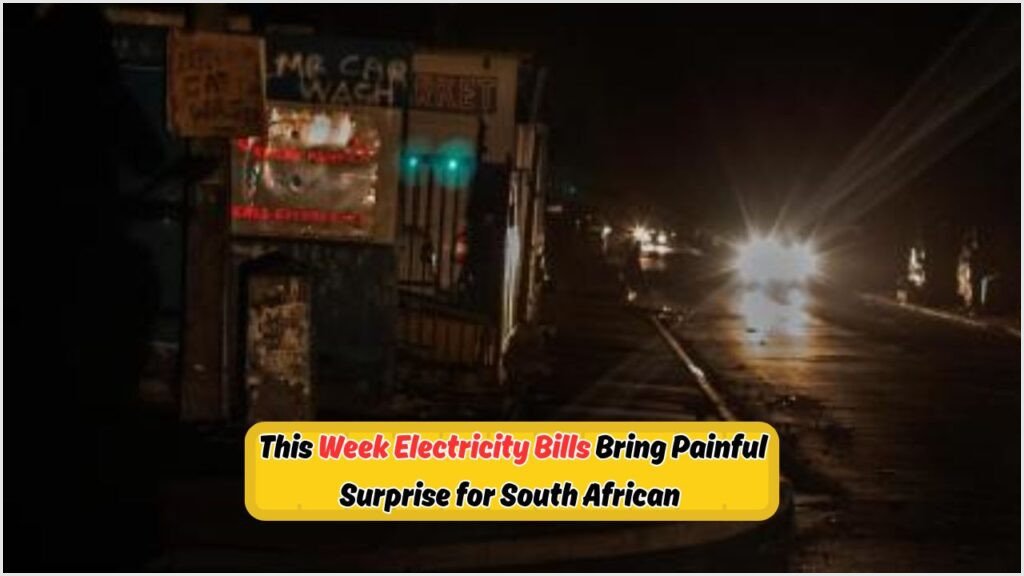Why South Africa’s Electricity Bills Are Skyrocketing: South Africa is grappling with a significant increase in electricity bills, leaving many citizens concerned about the impact on their monthly budgets. With the new charges introduced, understanding the reasons behind these rising costs is crucial. This article delves into the various factors contributing to the surge in electricity bills across the nation, providing an in-depth analysis of the new charges and their implications for South African households. As Eskom, the primary electricity supplier, implements these changes, both urban and rural communities are affected, prompting discussions on energy efficiency and alternative solutions to mitigate the financial strain.
Factors Driving Electricity Price Increases in South Africa
The electricity price hikes in South Africa are driven by several factors, each playing a significant role in the overall increase. One of the primary reasons is the ongoing financial challenges faced by Eskom, the state-owned power utility. The utility’s debt has risen dramatically over the years, necessitating tariff increases to manage its financial obligations. Additionally, maintenance and upgrading of aging infrastructure require substantial investment, further contributing to the price escalation. The reliance on coal-fired power plants, which are expensive to maintain and operate, also adds to the costs. Furthermore, the need to invest in renewable energy sources as part of the country’s commitment to reducing carbon emissions has financial implications that are reflected in consumer bills.
 Discover the Fastest Way to Unlock NSFAS Funds: Thousands Swear by This Proven Appeal Format!
Discover the Fastest Way to Unlock NSFAS Funds: Thousands Swear by This Proven Appeal Format!
- Eskom’s Financial Debt
- Infrastructure Maintenance Costs
- Dependence on Coal Power
- Investment in Renewable Energy
- Government Regulatory Changes
Understanding New Electricity Charges in South Africa
| Charge Type | Description | Impact | Reason | Solution | Timeline | Region |
|---|---|---|---|---|---|---|
| Basic Tariff | Monthly fixed charge | High | Infrastructure cost | Energy efficiency | Immediate | Nationwide |
| Usage Charge | Usage-based billing | Variable | Consumption | Reduce usage | Monthly | Nationwide |
| Environmental Levy | Carbon tax | Moderate | Renewable energy | Subsidies | Yearly | Nationwide |
| Peak Pricing | Higher rates at peak times | Moderate | Demand management | Off-peak usage | Seasonal | Nationwide |
| Infrastructure Charge | Network maintenance | High | System upgrades | Government funding | Ongoing | Nationwide |
| Renewable Energy Surcharge | Support for green energy | Low | Environmental goals | Incentives | Annual | Nationwide |
| Regional Surcharges | Specific area charges | Variable | Local needs | Local solutions | Varies | Specific regions |
Impact of Eskom’s New Charges on South African Households
The new charges introduced by Eskom have a profound impact on South African households, affecting both their financial planning and daily energy consumption habits. With the implementation of higher basic tariffs and usage charges, families are finding it increasingly challenging to balance their budgets. The environmental levy and peak pricing add to the burden, especially for those in lower-income brackets. These charges not only influence household expenses but also encourage a shift towards more energy-efficient practices. As a result, many South Africans are exploring alternative energy sources such as solar panels and energy-saving appliances to reduce their reliance on the national grid. The rising costs also highlight the importance of government intervention and support to alleviate the financial strain on citizens.
 August 17, 2025: R1,250 Foster Child Grant Payout Begins – Ensure You Receive Your SMS Alert!
August 17, 2025: R1,250 Foster Child Grant Payout Begins – Ensure You Receive Your SMS Alert!
- Increased Financial Burden
- Encouragement of Energy Efficiency
- Shift to Alternative Energy Sources
- Government Support Needed
- Impact on Low-Income Households
Strategies to Manage Rising Electricity Costs
Managing the rising electricity costs in South Africa requires a multifaceted approach, involving both individual and collective efforts. Households can adopt several strategies to mitigate the impact of higher bills. One effective method is to invest in energy-efficient appliances, which consume less power and reduce overall costs. Implementing smart meters can also help households monitor their usage and adjust their consumption patterns accordingly. Additionally, adopting renewable energy solutions, such as installing solar panels, can significantly decrease reliance on Eskom’s grid. On a larger scale, community initiatives promoting awareness and education about energy conservation can contribute to a more sustainable approach to electricity usage.
| Strategy | Benefits | Implementation Cost | Timeframe | Effectiveness |
|---|---|---|---|---|
| Energy-Efficient Appliances | Lower energy usage | Moderate | Immediate | High |
| Smart Meters | Usage monitoring | Low | Short-term | Moderate |
| Solar Panels | Renewable energy | High | Long-term | High |
| Community Initiatives | Increased awareness | Low | Ongoing | Moderate |
| Government Subsidies | Financial relief | Variable | Varies | High |
The Future of Electricity Pricing in South Africa
The future of electricity pricing in South Africa remains uncertain, with various factors influencing potential outcomes. As the country continues to grapple with economic challenges and the transition to renewable energy, electricity costs are expected to fluctuate. The government’s role in regulating and supporting the energy sector will be crucial in determining the trajectory of future pricing. Innovations in technology and a growing emphasis on sustainability could lead to more stable and affordable electricity in the long run. However, achieving this balance requires collaboration between the government, energy providers, and consumers. The focus must remain on creating a sustainable and equitable energy landscape that addresses both environmental concerns and the financial well-being of South Africans.
- Economic Challenges
- Transition to Renewable Energy
- Government Regulation
- Technological Innovations
- Sustainability and Affordability
FAQs About South Africa’s Electricity Costs
Understanding the nuances of South Africa’s electricity pricing can be complex. Here are some frequently asked questions to help clarify the situation:
- Why have electricity prices increased in South Africa? Due to Eskom’s financial challenges and infrastructure upgrades.
- How can households reduce their electricity bills? By adopting energy-efficient appliances and renewable energy solutions.
- What role does the government play in electricity pricing? The government regulates tariffs and provides subsidies to support low-income households.
- Are there alternatives to Eskom for electricity supply? Yes, many households are turning to solar energy as an alternative.
Insights into Electricity Pricing Policies
Understanding the intricate policies governing electricity pricing in South Africa reveals the complexities of balancing economic needs with environmental responsibilities. The National Energy Regulator of South Africa (NERSA) plays a pivotal role in overseeing and approving tariff adjustments, ensuring that changes align with national energy goals. The interplay between policy, consumer needs, and environmental targets creates a dynamic landscape that requires careful navigation by all stakeholders.
- Role of NERSA in Tariff Adjustments
- Balancing Economic Needs and Environmental Goals
- Importance of Stakeholder Collaboration
- Impact of Policy Changes on Consumers
Technological Advancements in Energy Efficiency
Technological innovation is key to enhancing energy efficiency in South Africa, offering promising solutions to reduce electricity consumption and costs. Advancements in smart grid technology enable more efficient energy distribution, reducing losses and enhancing reliability. Additionally, the development of energy storage systems, such as advanced battery technologies, allows for better management of energy supply and demand. These technologies hold the potential to revolutionize energy consumption patterns, providing a pathway towards a more sustainable and cost-effective energy future.
- Smart Grid Technology
- Energy Storage Systems
- Advanced Battery Technologies
- Enhanced Energy Distribution
- Cost-Effective Solutions
Investing in these technologies not only benefits individual consumers by reducing their electricity bills but also supports national energy goals by promoting sustainability and efficiency.
As South Africa continues its journey towards a sustainable energy future, embracing technological advancements and collaborative efforts will be essential in overcoming the challenges posed by rising electricity costs.
The commitment to innovation and sustainability promises a brighter, more efficient energy landscape for South Africans.
FAQ Section for South Africa’s Electricity Pricing
| Question | Answer | Details | Source | Updated |
|---|---|---|---|---|
| Why are electricity bills so high? | Due to infrastructure costs | Upgrades and maintenance | Eskom | 2023 |
| Can solar energy reduce bills? | Yes | Significantly | Renewable Energy Council | 2023 |
| How does peak pricing work? | Higher rates | During peak times | Energy Regulator | 2023 |
| What is the environmental levy? | Carbon tax | Funds green projects | Department of Energy | 2023 |
| Are there government subsidies? | Yes | For low-income families | Department of Social Development | 2023 |
Understanding these FAQs helps South Africans navigate the complexities of electricity pricing and empowers them to make informed decisions regarding their energy consumption.
As the nation looks towards a sustainable energy future, awareness and education will play critical roles in achieving these goals.
Staying informed about policy changes and technological advancements will enable consumers to adapt and thrive in this evolving landscape.
With continued efforts and collaboration, South Africa can overcome the challenges of rising electricity costs and secure a stable energy future.
Embracing renewable energy and efficient practices will pave the way for a more resilient and environmentally conscious society.
Together, South Africa can achieve its energy goals and ensure a brighter future for all its citizens.
How are the new electricity charges impacting South Africa's residents?
They are causing skyrocketing electricity bills and financial strain on households.




